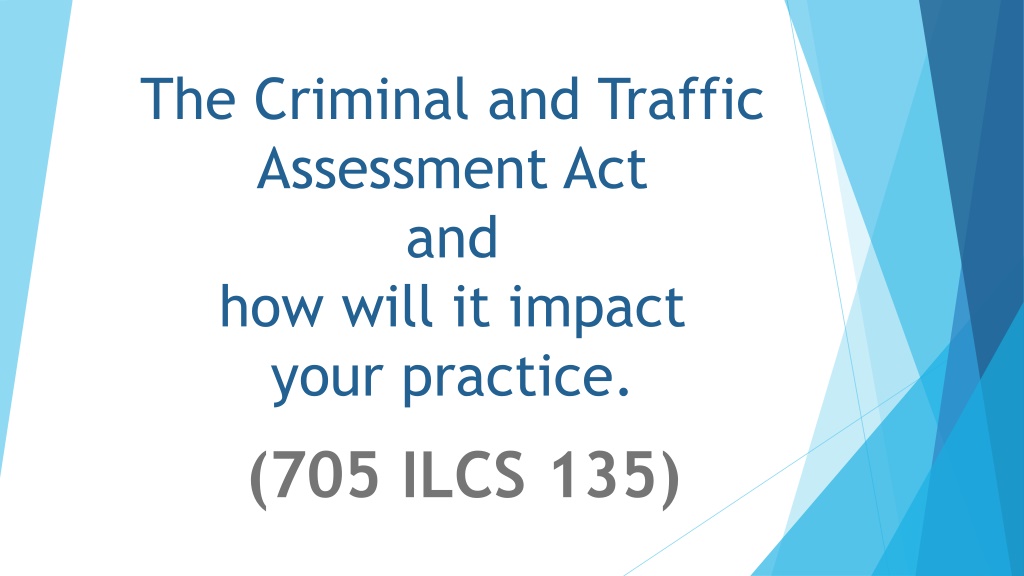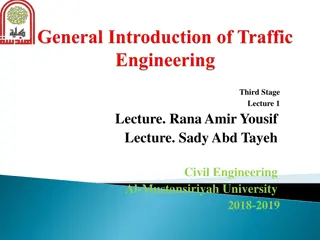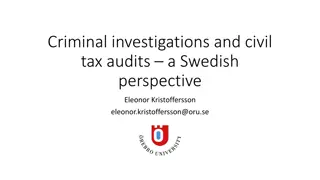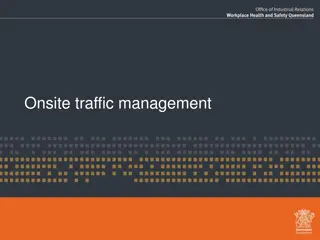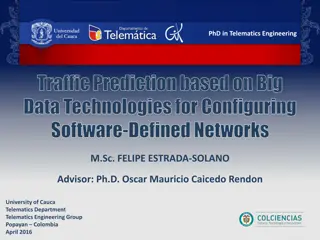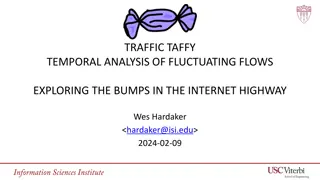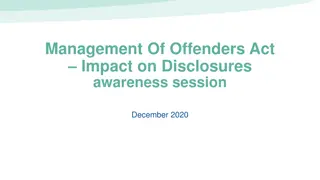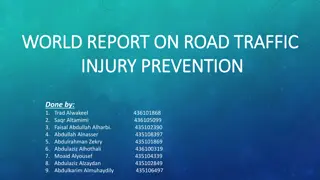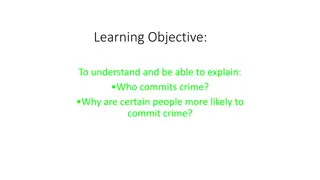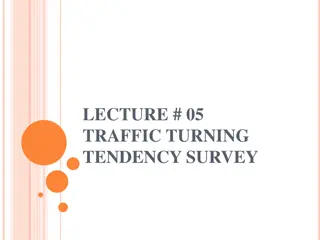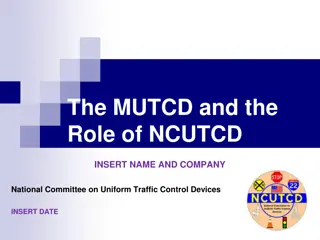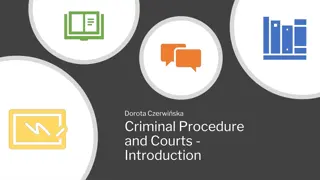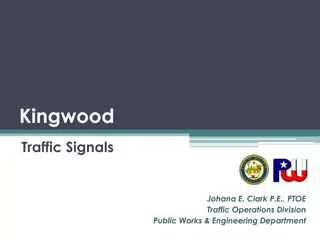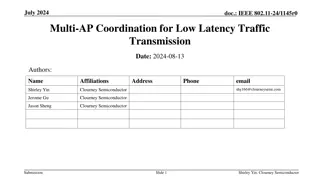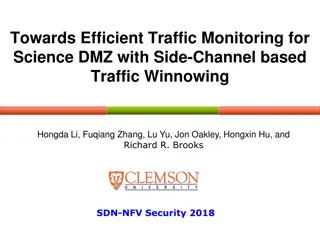Understanding the Impact of the Criminal and Traffic Assessment Act
The Criminal and Traffic Assessment Act (705 ILCS 135) impacts legal practice by consolidating fines, defining assessments, creating uniformity, providing sentencing options, and allowing for fee waivers. Financial sentencing components include fines, assessments, service provider costs, restitution, and forfeiture. Minimum fines are set by statute, with the ability for courts to adjust based on the victim's burden. Pre-paid traffic tickets under SCR 529 do not require a court appearance. This comprehensive overview sheds light on the key aspects of the Act and its implications for legal proceedings.
Download Presentation

Please find below an Image/Link to download the presentation.
The content on the website is provided AS IS for your information and personal use only. It may not be sold, licensed, or shared on other websites without obtaining consent from the author. Download presentation by click this link. If you encounter any issues during the download, it is possible that the publisher has removed the file from their server.
E N D
Presentation Transcript
The Criminal and Traffic Assessment Act and how will it impact your practice. (705 ILCS 135)
Criminal and Traffic Assessment Act Public Act 100-0987 (HB 4594) Effective July 1, 2019 Automatic repeal on January 1, 2021 What does this Act do? Consolidates fines, fees, and costs in one location Defines fine and assessment Creates uniformity Gives court and parties more options at sentencing Permits individuals to apply for fee waivers
Financial Sentencing Components What monetary components may be ordered? 1. A pecuniary fine on each count for which a defendant is being sentenced. 2. One criminal assessment schedule per case, based on the highest classified offense for which the defendant is being sentenced. 3. One or more conditional assessments specific to a convicted offense, or pertaining to specific conditions of the case. 4. Service provider costs that the defendant owes to a third party or to an adjacent agency or department as a result of a service performed. 5. Credit for time served or community service. 6. Restitution. 7. Forfeiture.
Financial Sentencing Components What monetary components may be ordered? 1. A pecuniary fine on each count for which a defendant is being sentenced. 2. One criminal assessment schedule per case, based on the highest classified offense for which the defendant is being sentenced. 3. One or more conditional assessments specific to a convicted offense, or pertaining to specific conditions of the case. 4. Service provider costs that the defendant owes to a third party or to an adjacent agency or department as a result of a service performed. 5. Credit for time served or community service. 6. Restitution. 7. Forfeiture.
Minimum Fine Amount Specified by statute I.e. 625 ILCS 5/3-707 (operation of uninsured motor vehicle) shall be required to pay a fine in excess of $500 but not more than $1,000 . If no fine is set by statute, the minimum fine as set by the Act: $25 for a minor traffic offense $75 for any other offense If the Court finds that the imposition of the fine may unduly burden the victim (language specifically states that does not include the defendant), the Court may reduce or waive the fine amount. 705 ILCS 135/5-5
Pre-paid Traffic Tickets (SCR 529) No Court Appearance Required Minor traffic tickets that are paid over the counter, under Supreme Court Rule 529, are not assessed additional statutory or minimum fines. Under Schedule 12 (upcoming), an individual is assessed $164. Statutory or minimum fines from the preceding slide are only assessed on in- court appearances.
Financial Sentencing Components What monetary components may be ordered? 1. A pecuniary fine on each count for which a defendant is being sentenced. 2. One criminal assessment schedule per case, based on the highest classified offense for which the defendant is being sentenced. 3. One or more conditional assessments specific to a convicted offense, or pertaining to specific conditions of the case. 4. Service provider costs that the defendant owes to a third party or to an adjacent agency or department as a result of a service performed. 5. Credit for time served or community service. 6. Restitution. 7. Forfeiture.
Assessment Schedule The Court orders only one assessment schedule at sentencing. The assessment schedule ordered should be the schedule associated with the highest classified offense. "Highest classified offense" means the offense for which the defendant is convicted or granted supervision that carries the most severe sentence. If the Court finds that the imposition of the assessment schedule may unduly burden the victim, the Court may reduce the scheduled amount. 705 ILCS 135/5-10
Assessment Schedules Schedule Number 1 2 3 4 5 6 7 8 9 10 10.5 11 12 Offense Type Amount Generic Felony Offense (CF) Felony DUI Offense (CF) Felony Drug Offense (CF) Felony Sex Offense (CF) Misdemeanor Generic Offense (CM) Misdemeanor DUI Offense (DT) Misdemeanor Drug Offense (CM) Misdemeanor Sex Offense (CM or DV) $1,184 Major Traffic Offense (TR) Minor Traffic Offense (TR) Truck Weight and Load Offenses (TR) Conservation Offenses (CV) Dispositions under Supreme Court Rule 529 (TR) Ordinance Violations (OV) $549 $1,709 $2,215 $1,314 $439 $1,381 $905 $325 $226 $260 $195 $164 13 $100 705 ILCS 135/15
Minor Traffic Offense means a petty offense or business offense under the Illinois Vehicle Code or a similar provision of local ordinance. Major Traffic Offense means a traffic offense under the Illinois Vehicle Code or similar provision of local ordinance other than a petty or traffic offense that is punishable by a term of imprisonment of less than one year. Conservation Offense means any violation of the listed acts or similar local ordinances, except any offense punishable by imprisonment in the penitentiary. "Drug Offense" means any violation of the Cannabis Control Act, the Illinois Controlled Substances Act, the Methamphetamine Control and Community Protection Act, or any similar local ordinance which involves the possession or delivery of a drug. 705 ILCS 135/1-5
Offense Code Table The Administrative Office of the Illinois Courts publishes the Offense Code Table approximately twice a year(*) for: Legislative updates effective Jan 1 Legislative updates effective July 1 This table will assign an Assessment Schedule for each offense in the table. There is no flexibility to change the assessment schedule on the offense. (*) They do issue corrections for errors
Old Way vs New Way For offenses committed after July 1, 2019 they will be assessed and disbursed under the newway aka the Assessment Schedules, etc. For offenses committed before July 1, 2019, but being sentenced after July 1, 2019, the prosecuting and/or defense attorney should determine if the old way or the newway is more advantageous to the defendant. For non-must appear traffic tickets written after July 1, 2019 that still say $120 on the face of the citation, we will pro-rate the prepaid amount at $120/$164 (73.2%) across the entire Schedule 12.
Assessment Payment Options 705 ILCS 135/5-10 (b) court can waive or reduce assessment schedule if burden on victim OR if court orders community service or some other punishment in place of assessment schedule (c) court can set payment plan for assessments Immediately Within a specified period of time Under an installment plan (c-3) court can extend probation, conditional discharge, or supervision until assessment schedule paid in full. (c-5) successful substance abuse intervention or treatment program credit 705 ILCS 135/5-10
Substance Abuse Treatment Program 705 ILCS 135/5-10(c-5) Court may suspend the collection of the assessment schedule provided the defendant agrees to enter a substance abuse intervention or treatment program. The court shall not reduce the assessment under this subsection unless the defendant establishes to the satisfaction of the court that he or she has successfully completed the intervention or treatment program. If the defendant's participation is for any reason terminated before his or her successful completion of the intervention or treatment program, collection of the entire assessment imposed under this Act shall be enforced. Only upon successful completion, the defendant may then ask the Court to reduce the assessment schedule by the amount actually paid by the defendant for their participation in the program. The Court may take this action at any time. Only applies to assessment schedule. 705 ILCS 135/5-10
Community Service 705 ILCS 135/5-20(b) Defendant may petition the Court to convert all or part of the assessment schedule into court-approved Community Service. At the rate of $4/hour. Does not apply to conditional assessments. The defendant may petition for community service at any time. This community service would be in addition to any other public or community service ordered by court or required by law. 705 ILCS 135/5-20
Financial Sentencing Components What monetary components may be ordered? 1. A pecuniary fine on each count for which a defendant is being sentenced. 2. One criminal assessment schedule per case, based on the highest classified offense for which the defendant is being sentenced. 3. One or more conditional assessments specific to a convicted offense, or pertaining to specific conditions of the case. 4. Service provider costs that the defendant owes to a third party or to an adjacent agency or department as a result of a service performed. 5. Credit for time served or community service. 6. Restitution. 7. Forfeiture.
Conditional Assessments 705 ILCS 135/15-70 Ordered in addition to assessment schedule. 18 applicable conditional assessments based on: The nature of the offense, i.e. an arson offense. Some component of the case, i.e. a domestic violence component on a battery offense. Conditional assessments are: Eligible for credit for time served credit. Not eligible for community service conversion. 705 ILCS 135/15-70
Subsection number Conditional Assessment Amount 1 Arson/residential arson/aggravated arson Child pornography $500 per count 2 $500 per count 3 Crime lab drug analysis $100 4 DNA analysis $250 per person 5 DUI analysis $150 6 and 7 Drug-related offense Street value 6.5 Kane or Will County case specific Order of protection violation Order of protection violation Up to $30 8 $200 per count 9 $25 per count 705 ILCS 135/15-70
Subsection number Conditional Assessment Amount 10 State s Attorney prosecution $4 per petty or business offense $2 per conservation or traffic offense $250 per count 11 Speeding in a construction zone 12 Supervision disposition for Vehicle Code offense Victim is family member 50 cents (waivable) 13 $200 per count 14 DUI emergency response Up to $1000 15 Drug emergency response Up to $1000 16 Reckless driving emergency response Up to $1000 17 Human trafficking $350 per count 18 Weapons offense $100 per count 705 ILCS 135/15-70
Financial Sentencing Components What monetary components may be ordered? 1. A pecuniary fine on each count for which a defendant is being sentenced. 2. One criminal assessment schedule per case, based on the highest classified offense for which the defendant is being sentenced. 3. One or more conditional assessments specific to a convicted offense, or pertaining to specific conditions of the case. 4. Service provider costs that the defendant owes to a third party or to an adjacent agency or department as a result of a service performed. 5. Credit for time served or community service. 6. Restitution. 7. Forfeiture.
Service Providers Costs "Service provider costs" are costs incurred for services provided by a judicial-adjacent or third-party entity including, but not limited to: Victim impact awareness Traffic safety programs Monthly probation fees Emergency responders Drug or alcohol testing/monitoring fees Laboratory tests Counseling, substance abuse programs, or DV programs 705 ILCS 135/1-5
Service Provider Assessments Service Provider fees may be assessed: Under the conditional assessments category depending on some case condition (like accidents involving emergency response). As standalone fees as part of sentence (like probation fees or drug testing). Service Provider costs are not eligible for: Credit for time served Substitution of community service Fee Waiver 705 ILCS 135/5-15
Financial Sentencing Components What monetary components may be ordered? 1. A pecuniary fine on each count for which a defendant is being sentenced. 2. One criminal assessment schedule per case, based on the highest classified offense for which the defendant is being sentenced. 3. One or more conditional assessments specific to a convicted offense, or pertaining to specific conditions of the case. 4. Service provider costs that the defendant owes to a third party or to an adjacent agency or department as a result of a service performed. 5. Credit for time served or community service. 6. Restitution. 7. Forfeiture.
Credit for Time Served 705 ILCS 135/5-20(a) Any credit for time served prior to sentencing Shall be deducted first from the fine, if any, ordered by the court. Any remainder of the credit shall be equally divided between the ordered assessment schedule and conditional assessments. The value is still $5/day, however there is pending legislation to raise this value to $30/day. Note this is not the same as the Bail Reform $30/day pre-trial credit. 705 ILCS 135/5-20
Community Service 705 ILCS 135/5-20(b) Defendant may petition the Court to convert all or part of the assessment schedule into court-approved Community Service. At the rate of $4/hour. Does not apply to conditional assessments. The defendant may petition for community service at any time. This community service would be in addition to any other public or community service ordered by court or required by law. 705 ILCS 135/5-20
Financial Sentencing Components What monetary components may be ordered? 1. A pecuniary fine on each count for which a defendant is being sentenced. 2. One criminal assessment schedule per case, based on the highest classified offense for which the defendant is being sentenced. 3. One or more conditional assessments specific to a convicted offense, or pertaining to specific conditions of the case. 4. Service provider costs that the defendant owes to a third party or to an adjacent agency or department as a result of a service performed. 5. Credit for time served or community service. 6. Restitution. 7. Forfeiture.
Restitution 730 ILCS 5/5-5-6 The ability to order restitution has not changed, and may be ordered on any sentenced count. Today, in DuPage County, any available bond money goes to court costs first, then to restitution. Any separate payments by the defendant go to restitution first. 730 ILCS 5/5-5-6
Forfeitures The ability to order a forfeiture has not changed, and may be ordered on any sentenced count. Since Bail Reform, the amount of funds available to be forfeited has substantially decreased.
Fee Waivers in Criminal Cases 725 ILCS 5/124A-20 Section 905-80 725 ILCS 5/124A-20
Overview Permits partial or full waiver of assessment schedule or conditional assessment as long as: Not an Illinois Vehicle Code violation, including DUI. Not a service provider cost. Application for waiver of assessments must be in writing and must be filed no later than 30 days after sentencing. If the Court finds a defendant indigent, the Court shall grant a full (100%) assessment waiver exempting the defendant from the payment of any assessments.
Indigency 725 ILCS 5/124A-20(a) "Indigent" means any person who meets one or more of the following criteria: (1) receiving assistance under one or more of the following programs: SSI, SSD, TANF, SNAP, GA, TA, SCFA; Supplemental Social Security, Temp. Assistance for Needy Families, Supp. Nutrition Assistance Program, General Assistance, Transitional Assistance (2) available personal income is 200% or less of the current poverty level as defined by the US Dept of Health and Human Services, and without substantial assets of a value that the court determines provides the ability to pay. (2019 - $12,490 + $4,420 per person) (3) the court determines that the defendant is unable to pay without substantial hardship to the person or their family. 725 ILCS 5/124A-20
Graduated Fee Waivers 100% waiver eliminates the schedule entirely. 25% fee waiver reduces the assessment schedule by 25%, leaving the defendant to pay 75%. 50% fee waiver reduces the assessment schedule by half. 75% fee waiver reduces the assessment schedule by 75%, leaving the defendant to pay 25%. 725 ILCS 5/124A-20
Factors to Consider The applicant's qualification for other governmental public benefits programs The employment status and amount of monthly income, if any; Income received from applicant's pension, SS, unemployment, and other sources; Income received by applicant from other household members; The applicant's monthly expenses; Financial affidavits or other similar supporting documentation provided by the applicant showing that payment of the imposed assessments would result in substantial hardship to the applicant or the applicant's family. 1. 2. 3. 4. 5. 6.
Poverty Levels up to 400% of the poverty level This chart displays the number of minors or disabled adults that the defendant is supporting, and their annual income. An amount less than the value shown, qualifies them for a certain waiver of their assessments schedule. For example, a defendant supporting a 4-person household, making $62,000 annually, qualifies for a 75% fee waiver.
Other Payment Options The court may allow any defendant: Defer payment until a reasonable future date. Make installment payments. Make payment upon reasonable terms and conditions.
Substance Abuse Treatment Program Credit CTAA Waiver *Does not apply to IVC violations Convert to Public Service Credit Credit Time Served Fines Schedule Assessments Conditional Assessments Service Providers
Supreme Court Rules 452, 472, 557, and 558
Supreme Court Rules 452 and 557 Effective March 1, 2019 Defendant or defense counsel to review the draft sentencing order imposing sentence and all applicable fines, fees, assessments, and costs prior to the State submitting the order to the court. (Rules 452 and 557)
Supreme Court Rules 472 and 558 Court retains jurisdiction to correct following sentencing errors at any time following judgment : Errors in imposition or calculation of fines, fees, assessments, or costs; Errors in the application of per diem credit against fines; Errors in the calculation of presentence custody credit; and Clerical errors in written sentencing order or other part of record resulting in discrepancy between the record and the actual judgment of the court Can no longer appeal any sentencing error unless alleged error has first been raised in circuit court. Any claim of error not raised shall be deemed forfeited. A court s judgment pursuant to this Rule constitutes a final judgment for purposes of appeal.
